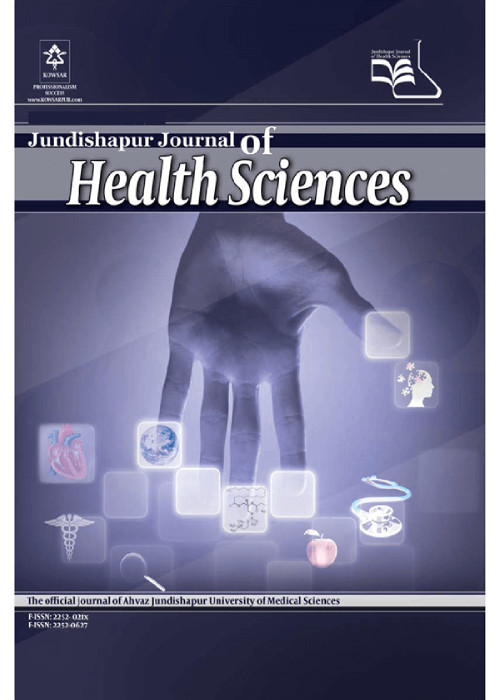Study of Zeolite and Vermiculite to Reduce Lead and Cadmium in Wastewater of Alcohol Factory
Author(s):
Article Type:
Research/Original Article (دارای رتبه معتبر)
Abstract:
Background
The wastewater of alcohol plants is called Vinasse. After conversion of molasses to alcohol and other derivatives, this compound must be removed as waste from the factory.If released without careful planning and proper management and supervision, this wastewater can cause serious and several social, economic, and environmental consequences. Therefore, it is very important to eliminate heavy elements before the waste goes deep into the soil or to underground water reservoirs.
Objectives
The aim of this study is to use 2 natural absorbents zeolite and vermiculite to low-off or lower the movement of heavy metals lead and cadmium in the soil.Methods
To evaluate the potential of Vermiculite and Zeolites in refinement of metal pollutants cadmium and lead, 2 irrigation periods by Vinasse and 3 treatments were conducted. First, the soil of the region was irrigated by Vinasse up to the saturation level. Second, the soil of the region with 2 layers of Zeolites in the depths of 25 cm and 50 cm was irrigated by Vinasse up to the saturation level. Third, the soil of the region with 2 layers of Vermiculites (same depths as treatment two) was irrigated by Vinasse up to the saturation level. The experiment was performed within columns with diagonal of 90 mm and height of 1000 mm. Surface irrigation (flooding) with the volume of 2.3 l was conducted every 5 days. Sampling in the depths of 15 - 25 cm and 40 - 50 cm of soil columns and drained water from the bottom of the soil columns were collected 24 hours after each irrigation and samples were taken to a laboratory to perform chemical analysis.Results
The results showed that before the experiment, the amounts of lead and cadmium in soil were 2.6 mg/kg and 42.0 mg/kg, respectively. As for Vinasse, the amounts were 46.2 and 7.11 mg/kg, respectively. After irrigation by Vinasse in the depth of 15-25 in treatments 1, 2, and 3, the increases in the level of cadmium were 0.034, 0.042, and 0.04 mg/kg, respectively. In addition, the increases in the level of lead in the depth of 30-50 in treatments 1, 2, and 3 were 0.28, 0.036, and 0.034 mg/kg, respectively.Conclusions
The concentration of lead in drainage water in all three treatments decreased. Vermiculite was not effective in adsorbing lead compared to the treatment in which no adsorbent was used.Keywords:
Vinasse , Irrigation , Cadmium , Lead
Language:
English
Published:
Jundishapur Journal of Health Sciences, Volume:10 Issue: 1, Jan 2018
Page:
2
magiran.com/p1799282
دانلود و مطالعه متن این مقاله با یکی از روشهای زیر امکان پذیر است:
اشتراک شخصی
با عضویت و پرداخت آنلاین حق اشتراک یکساله به مبلغ 1,390,000ريال میتوانید 70 عنوان مطلب دانلود کنید!
اشتراک سازمانی
به کتابخانه دانشگاه یا محل کار خود پیشنهاد کنید تا اشتراک سازمانی این پایگاه را برای دسترسی نامحدود همه کاربران به متن مطالب تهیه نمایند!
توجه!
- حق عضویت دریافتی صرف حمایت از نشریات عضو و نگهداری، تکمیل و توسعه مگیران میشود.
- پرداخت حق اشتراک و دانلود مقالات اجازه بازنشر آن در سایر رسانههای چاپی و دیجیتال را به کاربر نمیدهد.
دسترسی سراسری کاربران دانشگاه پیام نور!
اعضای هیئت علمی و دانشجویان دانشگاه پیام نور در سراسر کشور، در صورت ثبت نام با ایمیل دانشگاهی، تا پایان فروردین ماه 1403 به مقالات سایت دسترسی خواهند داشت!
In order to view content subscription is required
Personal subscription
Subscribe magiran.com for 70 € euros via PayPal and download 70 articles during a year.
Organization subscription
Please contact us to subscribe your university or library for unlimited access!


